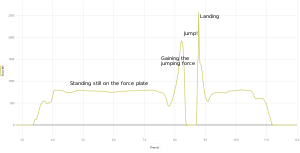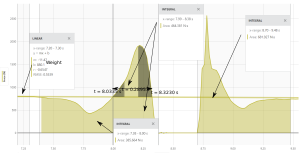Eksperimentti: hyppykorkeuden määrittäminen impulssilla: Difference between revisions
From wikiluntti
(→Theory) |
|||
| (21 intermediate revisions by the same user not shown) | |||
| Line 6: | Line 6: | ||
== Theory == | == Theory == | ||
[[File:ForcePlate jumping2 Impulse Areas.svg|thumb]] | |||
Impulse <math>J = \int F dt = \Delta p = m\Delta v</math>. Actually <math>\Delta v</math> is our takeoff speed because <math>v_1=0</math>, and we have <math>\Delta v = v_{0} = \frac{J}{m} = \frac1m \int F dt</math>. Because <math>s = s_0 + v_0 t + \tfrac12 at^2</math> and thus we have <math>h = v_0 t - \tfrac12 gt^2</math> because <math>h_0=0</math> and <math>a=-g = -9.81m/s^2</math>. However, for the velocity we have <math>v = v_0 - gt</math> and at the maximum height we have that <math>v=0</math>, and thus <math>v_0 = gt</math> and <math>t=\frac{v_0}{g}</math>. Combining these two we have | Impulse <math>J = \int F dt = \Delta p = m\Delta v</math>. Actually <math>\Delta v</math> is our takeoff speed because <math>v_1=0</math>, and we have <math>\Delta v = v_{0} = \frac{J}{m} = \frac1m \int F dt</math>. Because <math>s = s_0 + v_0 t + \tfrac12 at^2</math> and thus we have <math>h = v_0 t - \tfrac12 gt^2</math> because <math>h_0=0</math> and <math>a=-g = -9.81m/s^2</math>. However, for the velocity we have <math>v = v_0 - gt</math> and at the maximum height we have that <math>v=0</math>, and thus <math>v_0 = gt</math> and <math>t=\frac{v_0}{g}</math>. Combining these two we have | ||
<math> | <math> | ||
\begin{ | \begin{align} | ||
h &= v_0 t - \tfrac12 gt^2 \\ | h &= v_0 t - \tfrac12 gt^2 \\ | ||
&= v_0 \tfrac{v_0}g - \tfrac12 | &= v_0 \tfrac{v_0}g - \tfrac12 g\left( \frac{v_0}g \right)^2 \\ | ||
&= s | &= \frac{v_0^2}{g} - \tfrac12 \frac{v_0^2}{g} \\ | ||
\end{ | &= \frac{v_0^2}{2g} \\ | ||
&= \frac{J^2}{2gm^2} = \frac{1}{2g} \left( \frac Jm \right)^2 | |||
\end{align} | |||
</math> | |||
Note that <math>J/m = v_0</math>, and thus the equation gives the correct equation. | |||
=== Example === | |||
The example gives | |||
<math> | |||
\begin{align} | |||
m &= 880 N /9.81 = 89.7 kg \\ | |||
J &= 464 Ns - 89.7 kg \times 9.81 \times 0.2895 s = 464 Ns - 254.75 Ns = 209.25 Ns | |||
\end{align} | |||
</math> | |||
and thus we have | |||
<math> | |||
\begin{align} | |||
h &= \frac{J^2}{2gm^2} \\ | |||
&= \frac{(209.25 Ns)^2}{2 \times 9.81 m/s^2 \times (89.7 kg)^2 } \\ | |||
&= \frac{43785.5625}{315 728.5716} \\ | |||
&= 0.139 m\\ | |||
\end{align} | |||
</math> | </math> | ||
The takeoff velocity is <math>v_0 = \frac Jm = \frac{209.25 Ns}{89.7 kg} = 2.33 m/s</math>. | |||
== Example 2: Zero the force plate == | |||
== References == | |||
https://www.thehoopsgeek.com/the-physics-of-the-vertical-jump/ | |||
https://www.brunel.ac.uk/~spstnpl/LearningResources/VerticalJumpLab.pdf | |||
Latest revision as of 18:16, 3 May 2022
Introduction

Jumping on the force plate you can feel the force. We use time of flight method to estimate the height of the jump.
Theory

Impulse . Actually is our takeoff speed because , and we have . Because and thus we have because and . However, for the velocity we have and at the maximum height we have that , and thus and . Combining these two we have
Note that , and thus the equation gives the correct equation.
Example
The example gives
and thus we have
The takeoff velocity is .
Example 2: Zero the force plate
References
https://www.thehoopsgeek.com/the-physics-of-the-vertical-jump/
https://www.brunel.ac.uk/~spstnpl/LearningResources/VerticalJumpLab.pdf
















